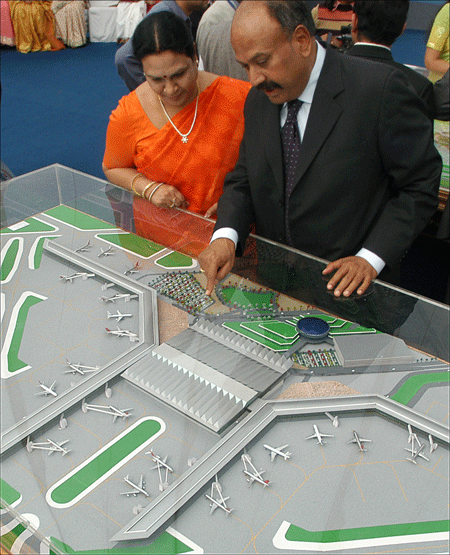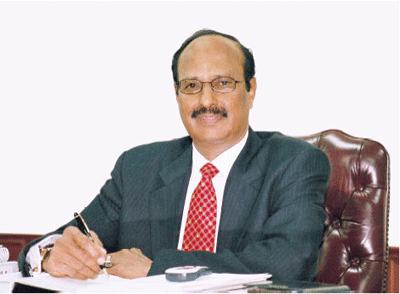India Airport Builders
Go International
 The
Indian aviation sector, which was on a high just about a couple of months
ago, has been going through air pockets of late. The
Indian aviation sector, which was on a high just about a couple of months
ago, has been going through air pockets of late.
That little fact, however, has not dimmed
the enthusiasm of those related to the aviation sector – at least
not those responsible for putting up infrastructure.
So while airport building slows a bit at
home, India’s airport builders are branching out overseas.
With the successful completion of the Greenfield
International Airport at Hyderabad, the GMR Group and rival GVK have been
seeking similar construction projects abroad.
The GMR Group led by the 57-year-old Grandhi
Mallikarjuna Rao, left (or GMR as he is popularly known) is one of the
fastest growing infrastructure organizations in India with interests in
airports, energy, highways and urban infrastructure.
Employing the Public-Private Partnership
model, the group has successfully implemented several infrastructure projects
in India.
At the beginning of this month (July), GMR
Infrastructure along with two other partners, Limak Insaat Sanavi and
Malaysia Airports Holdings, landed the contract to construct a new terminal
at the Sabiha Gokcen International Airport in Istanbul.
It was a victory for the Indian company
with only one airport on its job credit list.
Among those who had also bid for the project
were majors like Fraport, Venice Airport and others.
The Turkey venture is GMR Infrastructure's
first airport project outside of India.
According to those associated with the project,
the needle swung in favor of GMR because it had shown the capability to
handle growing traffic at the Hyderabad airport.
Apparently traffic growth at SGA is similar
to what has been seen in Hyderabad and New Delhi airports also handled
by GMR.
Expanding its presence beyond Europe, the
GMR group has recently bid to develop Chicago's Midway International Airport.
However, in this project, GMR will find
itself pitted against GVK, the business house that is managing and developing
the Mumbai International Airport for the airport privatization plan.
 Like
GMR, the GVK Group is a diversified business entity with its predominant
focus on infrastructure and urban infrastructure projects. Like
GMR, the GVK Group is a diversified business entity with its predominant
focus on infrastructure and urban infrastructure projects.
It has at its helm, the 71-year-old Gunapati
Venkata Krishna Reddy (or GVK as everyone likes to call him). According
to reports, along with GMR and GVK, there are at least six other bidders
for the project.
Midway is owned by the State of Illinois USA and whichever private consortium
is awarded the contract will be allowed to develop, operate and collect
revenue from the operation of the airport for 50 years.
The Chicago project is part of GMR's move
to become an internationally recognized airport developer.
In fact, the company has plans to venture
into South Africa, the Czech Republic and even Russia for similar airport
projects.
For GVK, the other major player in airport
infrastructure, Chicago Midway Airport will be an important milestone
too.
In fact, GVK Power and Infrastructure Ltd.,
a group company, has already outlined its plans to bid for airport projects
in Europe.
With no other big airports in the offing
domestically, it is but natural for companies like GMR and GVK to look
overseas.
According to reports, the privatization
of Midway would see the infrastructure companies sinking in more than
a billion dollars.
For its part, the City of Chicago has engaged
Credit Suisse Securities (USA) LLC as advisor and Bank of America, M.R.
Beal and Popular Securities as co-financial advisors to assist in evaluating
the execution of the long-term concession and lease of Chicago Midway
International Airport, as per the airport's website.
The proposed transaction would be the first
privatization of a major hub commercial airport in the United States.
The proposed transaction would be implemented under the Airport Pilot
Privatization Program authorized by U.S. federal law and administered
by the Federal Aviation Administration.
Tirthankar Ghosh
|



